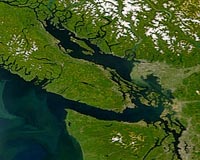| . |  |
. |
Halifax, Canada (AFP) Nov 20, 2009 US Secretary of Defense Robert Gates on Friday said Washington aims to boost cooperation with Canada in the Arctic, as Russia and others eye its vast untapped resources. "Canada and the US are both Arctic nations," said Gates. "We share an interest in developing more icebreaking ships for mobility and improving domain awareness to support search-and-rescue in light of increased tourism up north. "The melting of the polar ice cap in the Arctic, plus the frequency and intensity of weather events in this hemisphere -- with the corresponding need for military humanitarian assistance missions -- calls for a greater attention to the security implications of climate change," he said. Five countries bordering the Arctic -- Canada, Denmark, Norway, Russia and the United States -- claim overlapping parts of the region estimated to hold 90 billion untapped barrels of oil. Canada announced last year it was stepping up its military alertness along its northern frontier in response to Russian "testing" of its boundaries with military flights skirting the border which had not seen since the Cold War. Ottawa responded with plans for a sensor net, more navy patrols and a military training camp in the far north. Gates said in a speech to the international defense community: "Even as the US resets relations with Russia, we will work with Canada to ensure that increased Russian activity in the Arctic does not lead to miscalculation or unnecessary friction." Veteran Republican US Senator John McCain, who is also attending the summit, told reporters: "The Russians have at least rhetorically made comments about (Arctic) plans that could lead to great tensions. "It's very clear that the Canadian government is concerned about it," he said. "We're concerned about it." The United Nations Convention on the Law of the Sea stipulates that any coastal state can claim undersea territory 200 nautical miles from their shoreline and exploit the natural resources within that zone. Nations can also extend that limit to up to 350 nautical miles from their coast if they can provide scientific proof that the undersea continental plate is a natural extension of their territory. Moscow believes it should control the Northern Sea Route, a passage that stretches from Asia to Europe across northern Russia, and in 2007 planted a flag on the ocean floor beneath the North Pole in a symbolic staking of its claim over the region. Canada meanwhile has claimed the famed Northwest Passage, but is at odds with the United States which considers it to be international waters. Earlier this month, the USS Texas submarine surfaced at the North Pole on its maiden voyage -- showcasing Arctic travel capabilities that the Virginia-class submarine was not previously known to possess. This year, Russia also reportedly surprised the United States when it launched an intercontinental missile from a submarine in the Arctic Ocean. Share This Article With Planet Earth
Related Links Beyond the Ice Age
 Canada, US state give name to new sea
Canada, US state give name to new seaVancouver, Canada (AFP) Oct 31, 2009 The Salish Sea may never appear on official navigation maps, but residents of western regions in the United States and Canada hope a new name will protect their shared coastal waters. A Washington State agency approved the new name Friday for the body of water off North America's west coast that includes Puget Sound, the Strait of Juan de Fuca, and Georgia Strait. The name is partly in ... read more |
|
| The content herein, unless otherwise known to be public domain, are Copyright 1995-2009 - SpaceDaily. AFP and UPI Wire Stories are copyright Agence France-Presse and United Press International. ESA Portal Reports are copyright European Space Agency. All NASA sourced material is public domain. Additional copyrights may apply in whole or part to other bona fide parties. Advertising does not imply endorsement,agreement or approval of any opinions, statements or information provided by SpaceDaily on any Web page published or hosted by SpaceDaily. Privacy Statement |